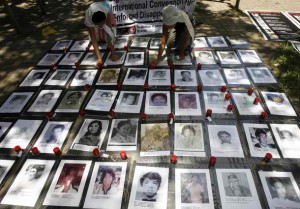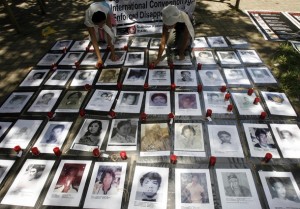IN the normal cycle of life, a person is born, he lives, he dies. He does not disappear.
Yet it happens. People disappear. Jonas Burgos, rural organizer and son of press freedom icon Jose Burgos, Jr., was never seen again after he was picked up by men believed to be members of the military in a Quezon City mall on April 28, 2007.
University of the Philippines students Karen Empeno and Sherlyn Cadapan also disappeared on June 26, 2006 while they were doing field work in Bulacan.
Burgos, Empeno and Cadapan are just three of the more than 2,000 documented cases of forced disappearances in the Philippines.
The number has not stopped increasing. The Asian Federation Against Involuntary Disappearances (AFAD) and Families of Victims of Involuntary Disappearance (FIND) continue to get reports of daughters, sons, wives and husbands nowhere to be found.
The phenomenon of involuntary disappearances is not peculiar to the Philippines. The term “desaparecidos” was coined during the “Dirty Wars” in Argentina (1976-1983) when the government waged a campaign against suspected dissidents and subversives. Tens and thousands of people “disappeared” in the middle of the night. They were taken to secret government detention centers where they were tortured and eventually killed.
There were reports of political dissidents heavily drugged and then thrown alive out of airplanes far out over the Atlantic Ocean, leaving no trace of their passing. Without any dead bodies, the government could easily deny that they had been killed. People murdered in this way are referred to as “the disappeared” or los desaparecidos.
It was against this backdrop of massive inhumanity that the United Nations adopted the International Convention for the Protection of All Persons from Enforced Disappearances in December 2006.
Buoyed by President Benigno Aquino’s campaign promise of “change” from the culture of impunity that flourished during the Arroyo administration, human rights advocates were hopeful that the Philippines would be among the first 20 states to sign and ratify the treaty.
A treaty needs the signature and ratification of 20 states to have the force of law.
In their meeting with Aquino last October, representatives of AFAD and FIND told him that neighboring Indonesia had just become the 19th state to sign the treaty. They reiterated their appeal to the President to sign the treaty and work for its immediate ratification. He said he would study it.
Last Nov. 23, Iraq, with a traumatic human rights history under Saddam Hussein, became the 20th state to sign and ratify the treaty, providing a breakthrough in the campaign to end enforced disappearances.
The treaty will take effect on Dec. 23, the 30th day after the submission of the 20th instrument of ratification.
Mary Aileen D. Bacalso, AFAD secretary general, said, “The forthcoming entry into force of the convention is a symbolic tribute to all the desaparecidos of the world who were plucked from the bosom of their families and continue to be deprived of their most basic right to life, liberty and many other basic human rights.”
“The UN Convention For the Protection of All Persons from Enforced Disappearance is a concrete legal measure which, when put in place, can be a powerful tool to help strengthen governments’ capacities to eradicate disappearances, punish the perpetrators and provide truth, justice, redress, reparation and historical memory to victims and their families,” she added.
Human rights lawyer Harry Roque, however, said since the Philippine is not yet a signatory to the treaty, victims of involuntary disappearances cannot seek protection under the treaty.
There is also no Philippine law making enforced disappearance a crime, except when it is committed widespread and in a systematic manner.
In the case of the six employees of Paper Industries Corp. of the Philippines who were abducted on Oct. 14 2000 by members of the 62nd Infantry Battalion, 8th Infantry Division of the Philippine Army and remain missing to this day, Cpl. Rodrigo Billones has been convicted but of kidnapping and serious illegal detention. Despite strong evidence, he was not charged with enforced disappearance due to the absence of an anti-enforced disappearance law.
Last August, Sen. Miriam Santiago filed Senate Bill No. 1455 that makes enforced and involuntary disappearances a crime, distinct from kidnapping, murder or serious illegal detention.
 In the meeting of human rights advocates with Aquino, he was informed that in 2006, the UN Working Group on Enforced or Involuntary Disappearances (UNWGEID) expressed the desire to come to the Philippines.
In the meeting of human rights advocates with Aquino, he was informed that in 2006, the UN Working Group on Enforced or Involuntary Disappearances (UNWGEID) expressed the desire to come to the Philippines.
Protocol, however, dictates that they have to be invited by the government. The first time UNWGEID came to the Philippines was during the time of President Corazon Aquino.
The President said he was not aware of the request and needed to study it.
“We hope that the Philippine government under the Aquino administration will finally fulfill its voluntary pledges before the UN Human Rights Council by acceding to this Convention without further delay and to help achieve its universal application,” Bacalso said.

